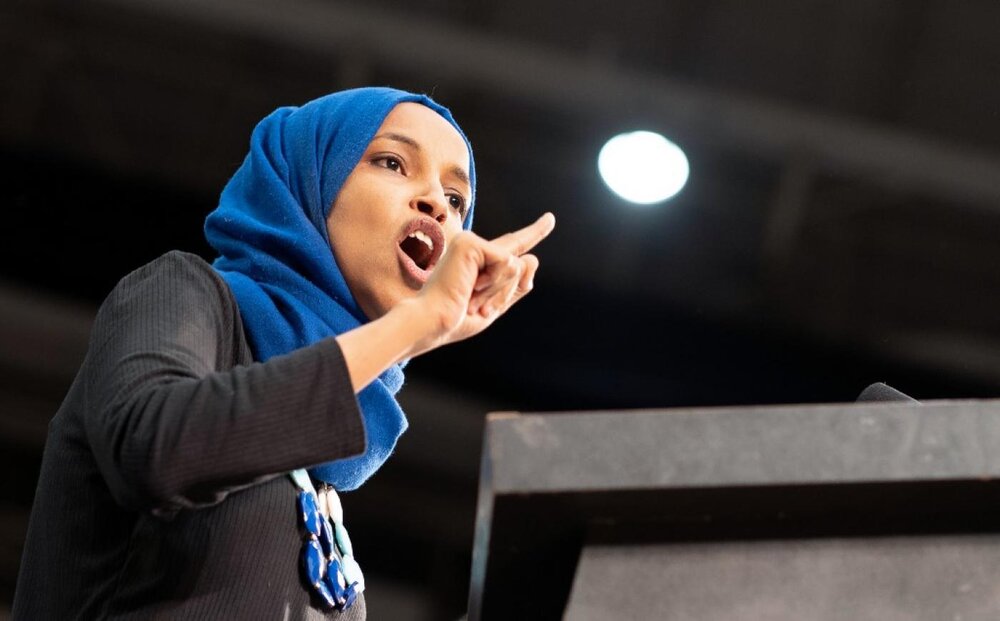Congresswoman Ilhan Omar has renewed calls for the U.S. to lift sanctions against Iran, as the country's crippled healthcare system struggles to deal with the rapid spread of the coronavirus, the Middle East Eye reported on Friday.
"We need to suspend these sanctions before more lives are lost," Omar said via Twitter on Friday, retweeting an earlier post made by well-known Iranian-American activist Hoda Katebi.
According to Iranian authorities, there have been more about 14,000 cases of the coronavirus - officially known as Covid-19 - and at least 724 deaths, making the Islamic Republic one of the countries worst hit by the virus.
Katebi said her aunt, who is a doctor in Iran, had reported "massive" shortages of medical supplies, including face masks, as the country struggles to deal with the spread of the disease.
"She keeps giving her face mask to other docs bc there aren't enough for everyone. For the love of GOD we need to end sanctions on Iran NOW," Katebi said on Twitter.
The situation in Iran is expected to worsen as Sunday saw the biggest single-day jump in cases since the virus was detected there.
The outbreak has prompted authorities to temporarily release about 70,000 prisoners to contain the spread of the illness, which has now reached all of Iran's cities.
On Friday, Iran's Foreign Minister Javad Zarif has sent a letter to UN Secretary-General Antonio Guterres, asking the international community to "disregard inhuman U.S. sanctions".
"As the #COVID19 ravages Iran, we should recognize that viruses don't discriminate. To fight them, neither should humans," Zarif said, sharing the letter on Twitter.
Seyyed Abbas Mousavi, a spokesman from the Foreign Ministry, later said that some nations had responded positively to the letter, but did not give specific details as to which countries had agreed to provide support.
“After the Twitter posts from Dr. Zarif, a number of countries and organizations expressed their readiness to send medical aid or to provide and sell them to Iran," Mousavi said.
Tara Sepehri Far, a researcher at Human Rights Watch, told Middle East Eye that confusion around U.S. sanction regulations have been a major obstacle in getting humanitarian aid into Iran.
"Even though humanitarian trade is exempted from sanctions, many companies and banks have been worried about engaging with Iran, fearing U.S. secondary sanctions," Far told MEE.
"Given the burden sanctions have already caused on Iranians access to healthcare, we think the U.S. and international community should proactively ensure Iran is receiving the medical supply and relief material they need to combat this very serious health crisis," she said.
Olivier Vandecasteele, Relief International’s (RI) country director for Iran, said that the impact of Covid-19 on Iran has been "enormous".
"The streets in Tehran are almost deserted," Vandecasteele said in an RI report on Wednesday.
RI has been working on the ground, partnering with the United Nations Refugee Agency (UNHCR) to help track distributed goods and increase the public’s understanding about strategies for preventing the spread of the virus, but U.S. sanctions have created extra obstacles, Vandecasteele said.
"One of the problems for international aid has been to clarify the legal issues related to sanctions to ensure that medical supplies and medicines can be brought into Iran," he explained.
'Sanctions are economic warfare'
Congresswoman Omar had been calling for an end to sanctions against Iran before the start of the outbreak.
"This makes no sense. Sanctions are economic warfare," Omar tweeted in January. "They have already caused medical shortages and countless deaths in Iran.
"You cannot claim to want de-escalation and then announce new sanctions with no clear goal. This is not a measured response!"


No comments:
Post a Comment